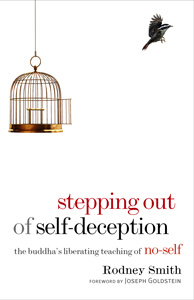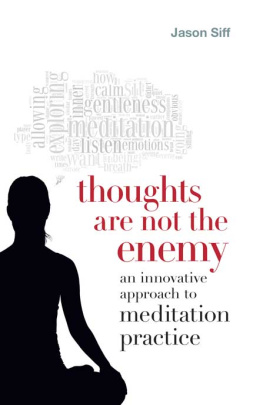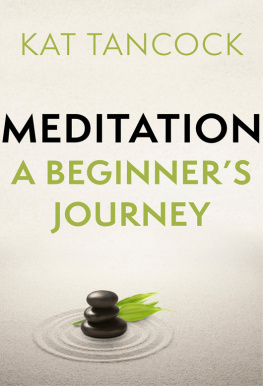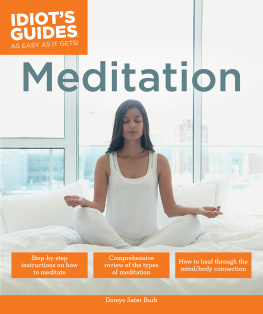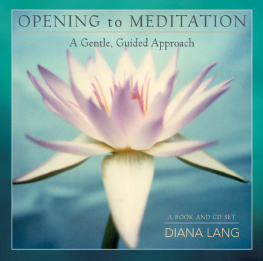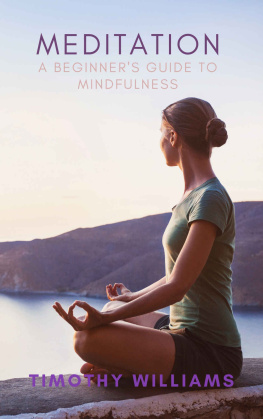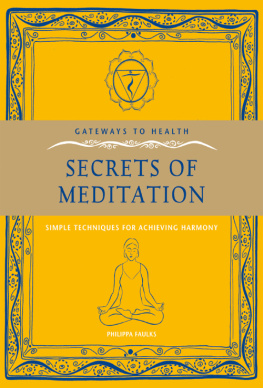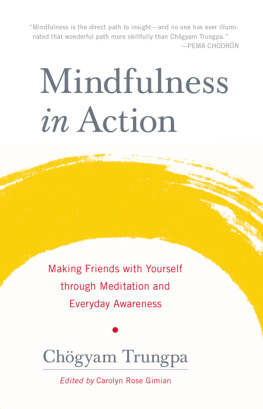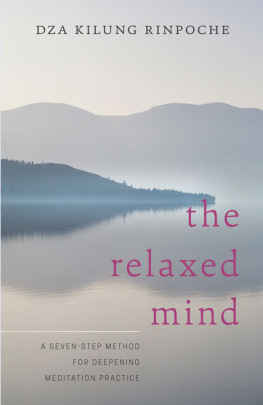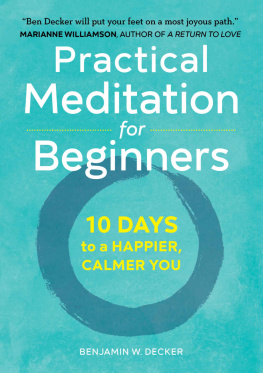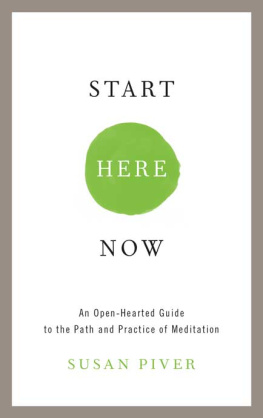A creative and illuminating approach to meditation practice.
Joseph Goldstein, author of Insight Meditation
A radically illuminating book for practitioners to newly understand their meditation through loving interest in what is actually going on, beyond any instruction or ideal.
Jack Kornfield, author of The Wise Heart
A wise, practical, and radical book that sheds new and wondrous light on dharma in the West.
Joan Halifax Roshi, author of Being with Dying
Jason Siff is one of the most distinctive and engaging voices of the emerging Buddhist culture in the West.
Stephen Batchelor, author of Confession of a Buddhist Atheist
[A] refreshing approach to meditation practice. Unlearning Meditation is an extremely valuable contribution to our emerging Western Dharma.
Inquiring Mind
ABOUT THE BOOK
When we meditate, our minds often want to do something other than the meditation instructions weve been taught. When that happens repeatedly, we may feel frustrated to the point of abandoning meditation altogether. Jason Siff invites us to approach meditation in a new way, one that honors the part of us that doesn't want to do the instructions. He teaches us how to become more tolerant of intense emotions, sleepiness, compelling thoughts, fantasiesthe whole array of inner experiences that are usually considered hindrances to meditation. The meditation practice he presents in Unlearning Meditation is gentle, flexible, permissive, and honest, and its been wonderfully effective for opening up meditation for people who thought they could never meditate, as well as for injecting a renewed energy for practice into the lives of seasoned practitioners.
JASON SIFF is the head teacher of the Skillful Meditation Project. He teaches meditation and leads retreats throughout the United States and in Australia.
Sign up to learn more about our books and receive special offers from Shambhala Publications.

Or visit us online to sign up at shambhala.com/eshambhala.
Unlearning
Meditation
What to Do When the Instructions Get in the Way
Jason Siff

Shambhala
Boston & London
2011
SHAMBHALA PUBLICATIONS, INC.
Horticultural Hall
300 Massachusetts Avenue
Boston, Massachusetts 02115
www.shambhala.com
2010 by Jason Siff
Cover design by Gopa & Ted2, Inc.
All rights reserved. No part of this book may be reproduced in any form or by any means, electronic or mechanical, including photocopying, recording, or by any information storage and retrieval system, without permission in writing from the publisher.
Library of Congress Cataloging-in-Publication Data
Siff, Jason.
Unlearning meditation: what to do when the instructions get in the way / Jason Siff.1st ed.
p. cm.
Includes index.
eISBN 978-0-8348-2314-3
ISBN 978-1-59030-752-6 (pbk.: alk. paper)
1. MeditationBuddhism. I. Title.
BQ5612.S54 2010
294.34435DC22
2010004658
To Jeremy Tarcher
Moving Beyond Meditators Guilt
When I am invited to teach a new group of meditators, I like to know how each person meditates and, generally, what kinds of experiences they have. So I begin by asking them to say a little something about their meditation practice. The first thing almost everyone says is, I dont meditate every day. This is said with a hint of shame.
I might then reply with this compassionate suggestion, You can meditate when you feel like meditating.
But then someone will usually say, But arent we supposed to meditate every day? And then they sometimes ask me, Dont you meditate every morning?
This is meditators guilt. It goes deep into the fabric of how we learn to meditate. Because when we learn how to meditate, we try to do the instructions perfectly, setting high standards for ourselves. We consequently experience periods of failure and inadequacy, along with the occasional moments of success, but it all adds up to guilt at not meditating often enough, not doing it well enough, not being the ideal meditator. And then we may also push ourselves too hard, sit with too much pain for too long, become intolerant of being caught up in our thoughts and feelings, and feel ashamed by the strength and tenacity of undesirable emotions.
Ive met quite a few people in the past two decades who, at one time or another, have either given up on meditation out of frustration or kept doing a meditation practice that is giving them more grief than peace. It doesnt have to be this way. There are alternatives. The method I teach, called Recollective Awareness Meditation, is one of them.
Just as we go through a period of learning how to meditate, we can also go through a period of unlearning meditation. This book will provide guidance on how to engage that process and in doing so will present the meditation experiences of people going through it. By reading other peoples experiences, you may find you are not alone in thisthat others have been through a period of unlearning the unwanted habits of their meditation practice and have arrived at a new commitment to meditation, along with a greater interest in, and appreciation of, their inner worlds.
I encounter many people who, once they hear that I am a meditation teacher, tell me that they cant meditate because they think too much. Some of them are professors, scientists, and psychologists, who use their thinking in their work and have developed as human beings through using their minds. Because they have gotten a picture of meditation as requiring a quiet, thought-free mind, they feel they cant do it. That is a real loss, a true shame. Recollective Awareness is an approach to meditation that not only doesnt prohibit thinking, but teaches a way of looking into your thoughts so that you can learn things about the thinking process itself. By taking this approach, paradoxically, many people find that their thinking minds actually quiet down, and they find themselves more able to focus on the physical and emotional sides of their experiences.
The effects of unlearning meditation can be many and varied. A wide range of emotions can arise. What has been hidden from awareness can be revealed. And people open up to a wide range of calm, tranquil states of mind. This can be a powerful meditation practice. But it is not for everyone; no single meditation practice is. It meets the needs of those experienced meditators who are seeking a gentle, open, and insightful form of meditation, as well as those who are new to meditation and are looking for a simple and effective way to begin a meditation practice.
Unlearning Meditation is not a book that rejects traditional meditation practices. You are not asked to drop your existing meditation practice for good and take up an altogether new form of meditation. Instead, this book provides observations and insights into how people meditate, what they experience, and what would be useful and skillful ways of being with what comes up in meditation sittings for most people. In my two decades of teaching meditation, there have been many instances of people who have unlearned specific meditation practices, only to return later to those practices with greater flexibility and interest, move on to another practice, or even develop their own way of meditating.
This approach to meditation comes directly out of my practice and study of the Dharma. It may appear to be more psychologically oriented than many other approaches, since it is a meditation practice for becoming aware of your thoughts and feelings; understanding your views, ideals, and beliefs; and seeing into how your mind functions both skillfully and otherwise. The kinship between psychotherapy and meditation is there, naturally, but the agendas are often different, and their direction (or trajectory) is different also. The value of Recollective Awareness, and I would say of Buddhist meditation practices in general, is to become aware of the dependently arisen nature of all mental phenomena and, through that way of knowing ones experience, to become wiser, gentler, and more peaceful.
Next page
